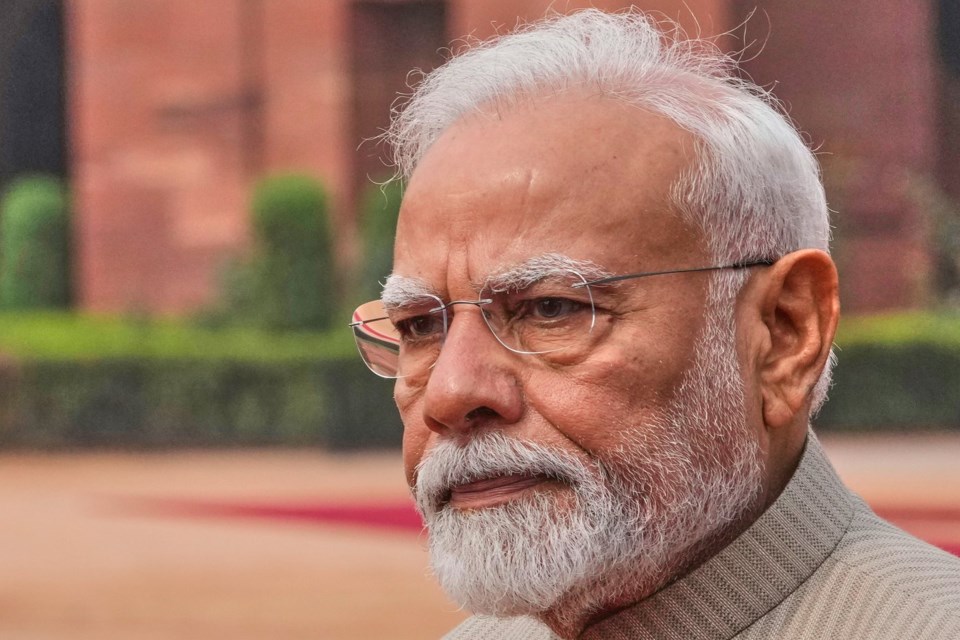OTTAWA — Sikh organizations are calling on Ottawa to break with a five-year tradition by not inviting Indian Prime Minister Narendra Modi to the G7 summit.
Canada is hosting the G7 leaders' summit next month in Kananaskis, Alta.
While the leaders of those G7 nations — France, the United Kingdom, Germany, Italy, Japan and the United States — are expected to attend, along with the president of the European Commission, Ottawa hasn't said which leaders it has invited from outside that core group of like-minded liberal democracies.
The Canadian Press learned Friday that Canada has invited Brazilian President Luiz Inácio Lula da Silva to attend the summit. Brazil's foreign ministry did not immediately say whether he has accepted the invitation.
The South African high commission has told The Canadian Press that Ottawa also invited President Cyril Ramaphosa to attend the summit. Ramaphosa, who is hosting the G20 summit this November in Johannesburg, has not said if he will attend.
Canada has invited both Ukrainian President Volodymyr Zelenskyy and Australian Prime Minister Anthony Albanese to the summit; both have said they will attend.
Mexican President Claudia Sheinbaum said this week that Canada had invited her nearly two weeks prior but she had not yet decided whether she'll attend.
Modi has been invited to every G7 leaders' summit since 2019 and Canada and India have signalled recently a possible thaw in relations after months of tensions.
But the Toronto-based Sikh Federation said this week that Canada should withhold any invitation "until India substantially co-operates with criminal investigations in Canada."
They point to Canada's allegation that New Delhi played a role in the assassination of a Sikh activist near Vancouver in 2023, and in numerous other violent crimes.
The Sikh Federation and the World Sikh Organization have expressed concerns about the federal Liberals seeking deeper ties with India.
Foreign Affairs Minister Anita Anand said recently she had a "productive discussion" with her Indian counterpart on May 25 about "deepening our economic co-operation and advancing shared priorities."
The Sikh groups argue this suggests the federal government is putting economic concerns ahead of human rights.
The Liberals originally made India the focus of their Indo-Pacific strategy in late 2022, describing the country as a democratic nation with strong trade potential.
That all changed after the June 2023 assassination of Sikh activist Hardeep Singh Nijjar in British Columbia.
Months later, the government accused India of involvement in his death. The RCMP says it has evidence that New Delhi is behind numerous crimes targeting Sikh-Canadians.
India claims Canada is enabling a separatist movement that calls for a Sikh homeland — Khalistan — to be carved out of India, and calls that a violation of its sovereignty. Ottawa has long held that it allows free speech that doesn't call for violence.
Prime Minister Mark Carney said during the recent election campaign he wants to pursue trade with India. He said India could play a key role in ending the trade wars if it shows "mutual respect" in light of "strains on that relationship that we didn't cause."
India's high commission referred an interview request on the bilateral relationship to the country's foreign ministry in New Delhi.
Global Affairs Canada hasn't released the names of every leader Ottawa has invited to the summit. Department spokeswoman Camie Lamarche said the names will be "made available in due time."
Since the April 28 federal election, Carney’s office has published readouts of discussions with his counterparts from the G7 countries, along with Australia, Ukraine, Mexico, New Zealand, Denmark, Spain, the Netherlands, Poland, Norway and Jordan.
G7 hosts in recent years have invited four or more guests. Canada invited a dozen when it last hosted the summit in 2018, including Haiti, the Seychelles, Norway and Argentina.
This report by The Canadian Press was first published May 30, 2025.
Dylan Robertson, The Canadian Press




